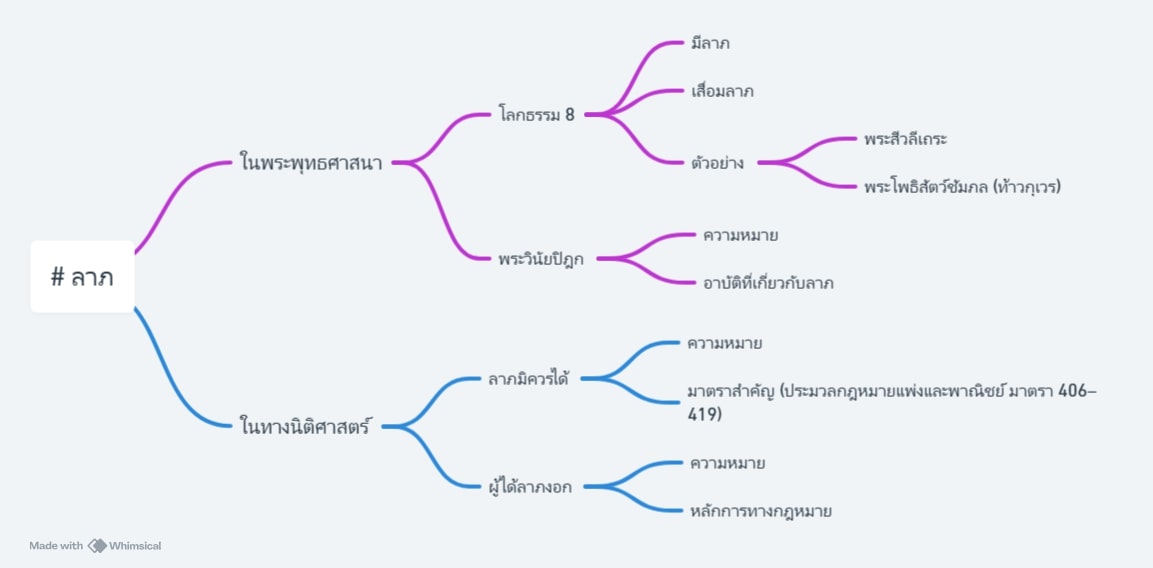Fortune in Buddhism and Jurisprudence
Keywords:
Enrichment, Fortune, Undeserving Fortune, Worldly ConditionsAbstract
This study aims to examine: (1) fortune in Buddhism and (2) fortune in jurisprudence using documentary research. The findings reveal that fortune in Buddhism, as mentioned in the Sutta Pitaka, is explained within the context of the "Worldly Conditions 8" and can be categorized into two types: (1) Having Fortune, which refers to something everyone desires, enjoys, and wishes for; and (2) Loss of Fortune, which refers to the loss of possessions, a natural occurrence in the world where what is gained will inevitably be lost. The preeminent example of great fortune in Theravada Buddhism is Phra Siwali Thera, while in Mahayana Buddhism, it is represented by Bodhisattva Champhon (God Kuvera). In the Vinaya Pitaka, fortune is defined as including robes, alms, lodging, medicinal requisites for sick monks, and even items such as powdered medicine, a tooth-cleaning stick, or a piece of cloth. Regarding "misdemeanors caused by fortune," it is mentioned that when a monk perceives fortune as being "offered for oneself," it becomes Nissaggiya and requires conviction of Pācittiya. In jurisprudence, fortune in Thai law includes: (1) Undue Gain, which refers to any property acquired without legal justification and to the disadvantage of another person. Such a person is obligated to return the property under Civil and Commercial Code, Section 406, which states: “Anyone who acquires property due to another person's actions, such as settling a debt or through other means without legal justification, causing another person's disadvantage, must return the property to the rightful owner…”; and (2) Receiving a Windfall, which refers to someone who directly engages in a legal act with a debtor and benefits from it. According to Civil and Commercial Code, Section 237, Paragraph 1, it is stated: “A creditor has the right to petition the court to revoke any legal act performed by a debtor knowingly causing disadvantage to the creditor...”.
References
กรมศิลปากร. พิพิธภัณฑสถานแห่งชาติ สงขลา. พิมพ์ครั้งที่ 2. กรุงเทพมหานคร: สมาพันธ์ จำกัด. 2543.
คณะวิชาการ The Justice Group. ประมวลกฎหมายแพ่งและพาณิชย์ บรรพ 1-6 (ฉบับแก้ไขเพิ่มเติมใหม่ล่าสุด พ.ศ. 2564). กรุงเทพมหานคร: พิมพ์อักษร. 2564.
สมยศ เชื้อไทย. ประมวลกฎหมายแพ่งและพาณิชย์ (ฉบับใช้เรียน). กรุงเทพมหานคร: วิญญูชน. 2567.
พรชัย สุนทรพันธุ์. คำอธิบาย กฎหมายลักษณะมรดก. กรุงเทพมหานคร: สำนักอบรมศึกษากฎหมายแห่งเนติบัณฑิตยสภา. 2566.
มานิตย์ จุมปา. คำอธิบายประมวลกฎหมายแพ่งและพาณิชย์ว่าด้วยทรัพย์สิน. กรุงเทพมหานคร: สำนักพิมพ์จุฬาลงกรณ์มหาวิทยาลัย. 2565.
ดาราพร ถิระวัฒน์. กฎหมายหนี้ หลักทั่วไป. พิมพ์ครั้งที่ 5. กรุงเทพมหานคร: สำนักอบรมศึกษากฎหมายแห่งเนติบัณฑิตยสภา. 2567.
เดือนเด่น นาคสีหราช. สรุปหลักกฎหมายลักษณะละเมิด จัดการงานนอกสั่ง ลาภมิควรได้ (ฉบับพร้อมสอบ). กรุงเทพมหานคร: วิญญูชน. 2567.
ประยงค์ แสนบุราณ. พุทธศาสนาเถรวาท. ขอนแก่น: คลังนานาวิทยา. 2559.
ปิ่น มุทุกันต์. พุทธศาสตร์. พิมพ์ครั้งที่ 1. กรุงเทพมหานคร: มหามกุฏราชวิทยาลัย. 2535.
ผาสุข อินทราวุธ. พุทธปฏิมาฝ่ายมหายาน. กรุงเทพมหานคร: โรงพิมพ์อักษรสมัย. 2543.
พระธรรมกิตติวงศ์, (ทองดี สุรเตโช, ราชบัณฑิต). พจนานุกรมเพื่อการศึกษาพุทธศาสนา “คําวัด”. กรุงเทพมหานคร: ธรรมสภา. 2551.
พระพรหมคุณาภรณ์ (ป.อ. ปยุตฺโต). พุทธธรรม (ฉบับปรับปรุงและขยายความ). พิมพ์ครั้งที่ 11. กรุงเทพมหานคร: โรงพิมพ์มหาจุฬาลงกรณราชวิทยาลัย. 2552.
สุพิศ ปราณีตพลกรัง. หลักและทฤษฎีกฎหมายแพ่ง. พิมพ์ครั้งที่ 5. กรุงเทพมหานคร: นิติธรรม. 2566.
แสวง บุญเฉลิมวิภาส และคณะ. ประวัติศาสตร์กฎหมายไทย. กรุงเทพมหานคร: วิญญูชน. 2565.
จันตรี สินศุภฤกษ์. ความรู้เบื้องต้นเกี่ยวกับกฎหมาย. กรุงเทพมหานคร: นิติธรรม. 2565.
มหาจุฬาลงกรณราชวิทยาลัย. พระไตรปิฎกภาษาไทย ฉบับมหาจุฬาฉบับมหาจุฬาลงกรณราชวิทยาลัย. กรุงเทพมหานคร: มหาจุฬาลงกรณราชวิทยาลัย. 2539.
________. พระวินัยปิฎก. กรุงเทพมหานคร: มหาวิทยาลัยมหาจุฬาลงกรณราชวิทยาลัย. 2551
เสฐียรพงษ์ วรรณปก. พุทธสาวก พุทธสาววิกา. พิมพ์ครั้งที่ 2. กรุงเทพมหานคร: ธรรมสภา. 2555.
องอาจ ศรียะพันธ์. “รูปเคารพในพุทธศาสนามหายานก่อนพุทธศตวรรษที่ 19 พบที่เมืองสทิงพระ”. วิทยานิพนธ์ปริญญาศิลปศาสตรมหาบิณฑิต สาขาวิชาประวัติศาสตร์ศิลปะ คณะโบราณคดี. บัณฑิตวิทยาลัย: มหาวิทยาลัยศิลปากร, 2533.
อุษา โพธิกนิษฐ. “การศึกษารูปแบบและคติการนับถือพระกุเวรในสมัยทวารวดี”. วิทยานิพนธ์ปริญญาศิลปศาสตรมหาบิณฑิต สาขาวิชาโบราณคดีสมัยประวัติศาสตร์ คณะโบราณคดี. บัณฑิตวิทยาลัย: มหาวิทยาลัยศิลปากร, 2527.

Downloads
Published
How to Cite
License
Copyright (c) 2024 Journal of Modern Academic Social Science ISSN: 3056-9958 (Online)

This work is licensed under a Creative Commons Attribution-NonCommercial-NoDerivatives 4.0 International License.





